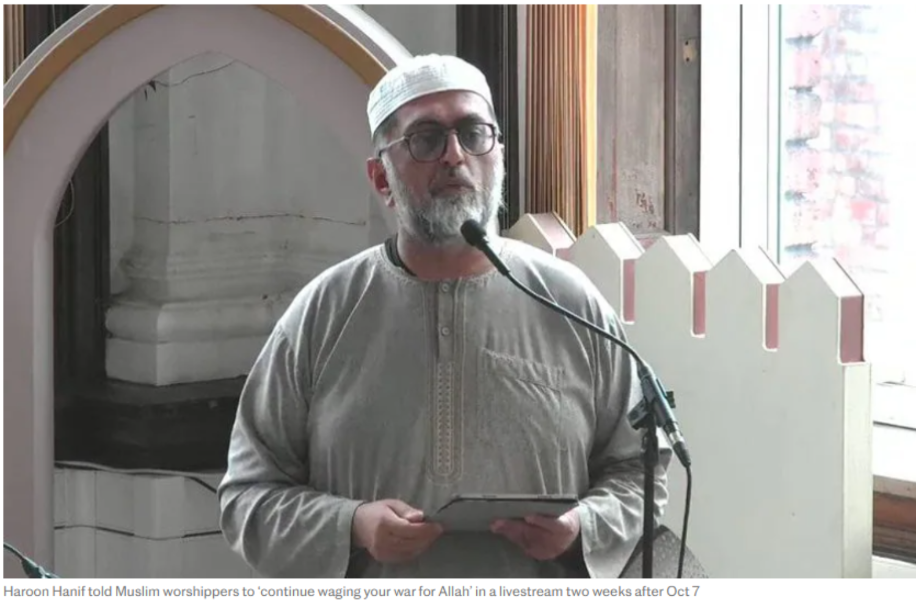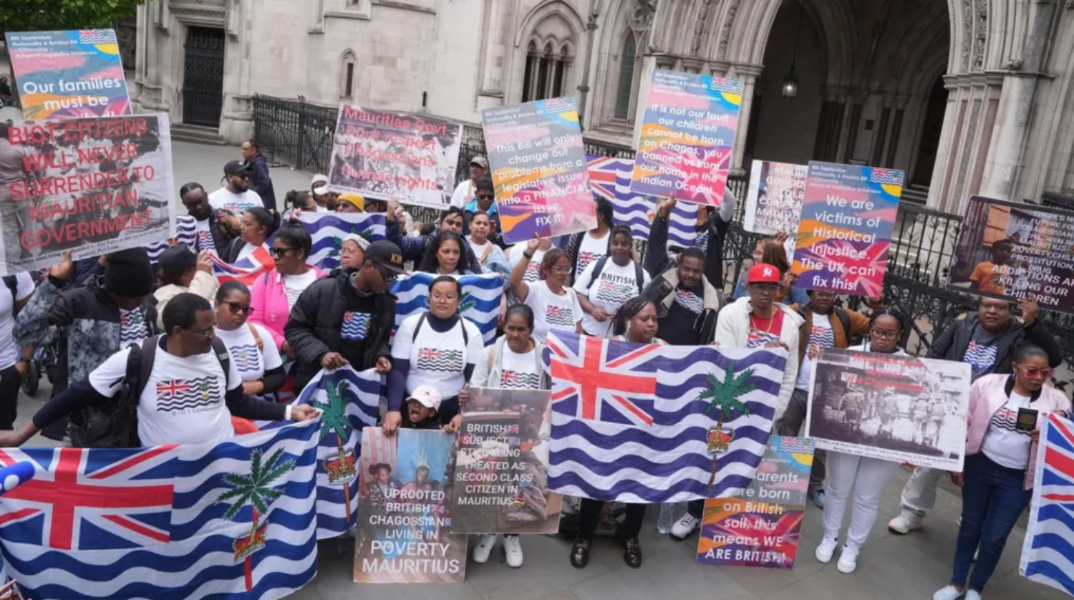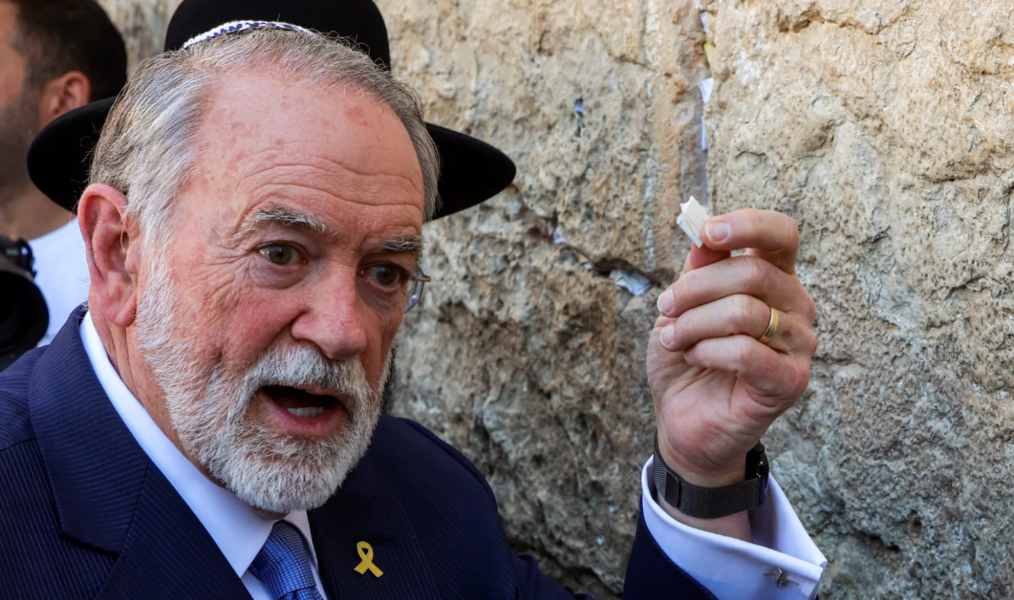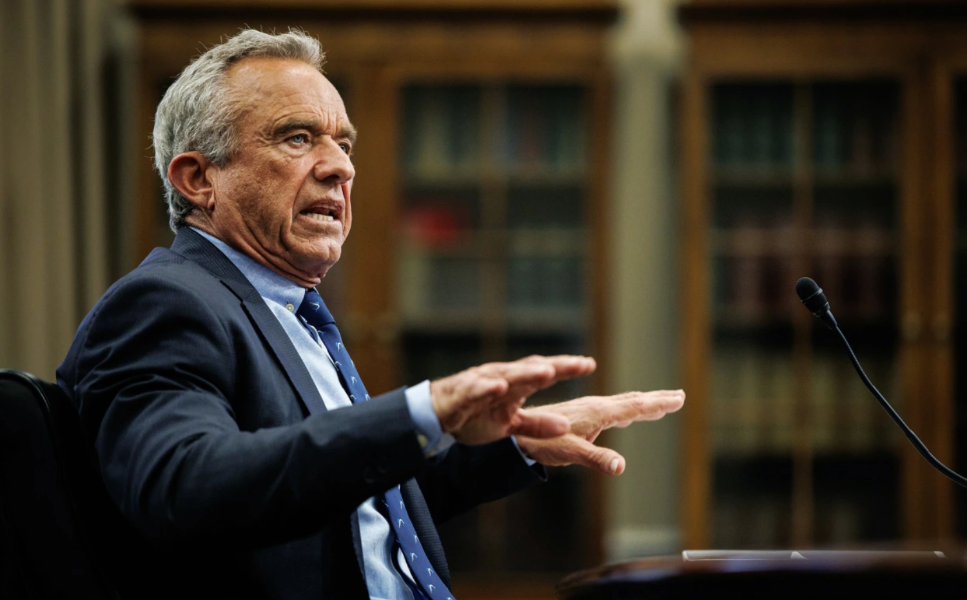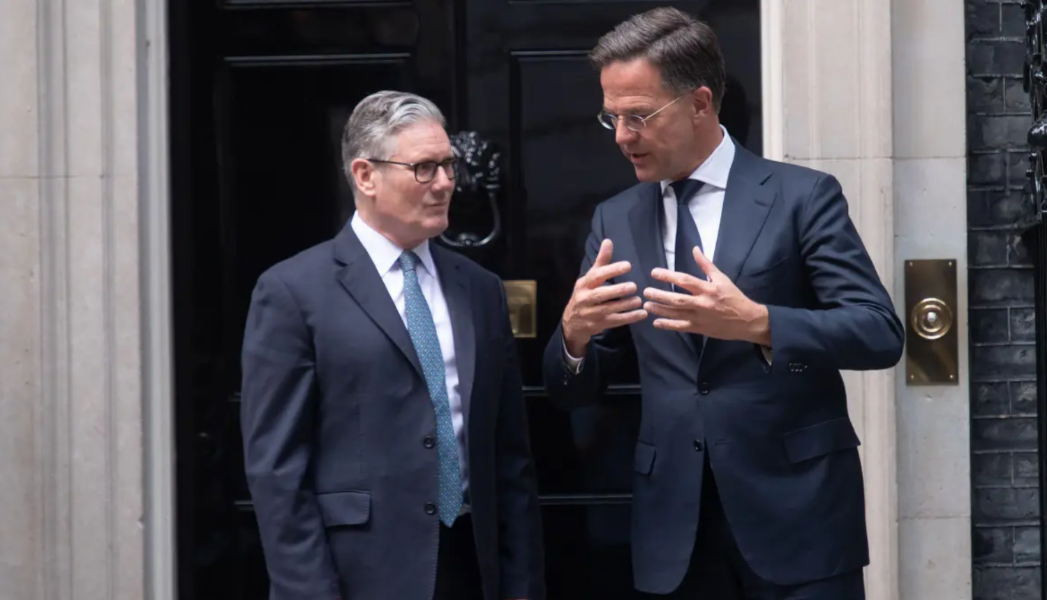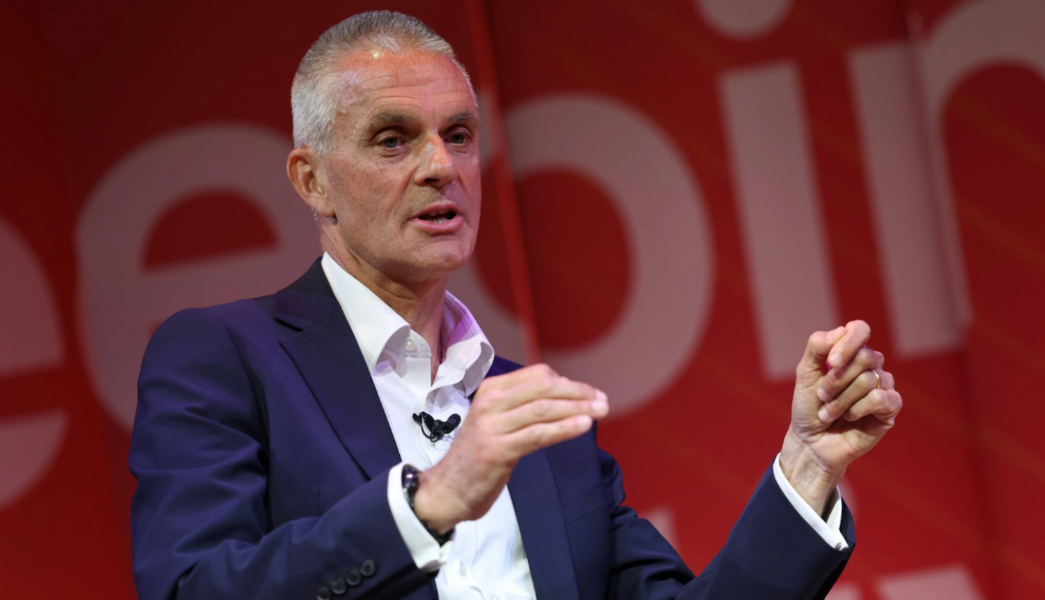-
Posts
10,778 -
Joined
-
Last visited
Content Type
Events
Forums
Downloads
Quizzes
Gallery
Blogs
Everything posted by Social Media
-
Germany Warns of Russian Plans to Test NATO’s Unity and Push Back Western Boundaries Germany’s top intelligence official has sounded the alarm over what he describes as “concrete” evidence that Russia is planning to challenge NATO, potentially through a calculated test of the alliance’s Article 5 mutual defense clause. Bruno Kahl, the outgoing head of Germany’s Federal Intelligence Service (BND), issued the warning during a rare interview, in which he said Russian leadership no longer believes NATO’s guarantee of collective defense will be upheld—and may be preparing to find out. “We are very sure, and we have intelligence evidence to back this up, that [Russia’s full-scale invasion of] Ukraine is only one step on Russia’s path towards the West,” Kahl told a podcast hosted by the German outlet Table Briefings. While he clarified that this does not suggest “large tank battalions” will immediately begin rolling westward, he stressed that NATO’s core commitment to mutual defense is under direct scrutiny by Moscow. “We see that NATO is supposed to be tested in its mutual assistance promise. There are people in Moscow who don’t believe that NATO’s Article 5 still works,” he added. Germany’s Defense Minister Boris Pistorius has echoed similar concerns in recent months. While acknowledging that a Russian attack is not imminent, he has emphasized the importance of preparedness. “At the moment, I don’t think a Russian attack is likely,” Pistorius told Tagesspiegel in a 2023 interview. “Our experts estimate that it could be possible within a period of five to eight years.” This timeline aligns with a February assessment by the Danish Defence Intelligence Service, which stated that once the war in Ukraine concludes, the Kremlin could redeploy significant military resources toward another conflict—possibly within six months—targeting a country on Russia’s border. Kahl, who is set to become Germany’s ambassador to the Vatican, warned that Moscow’s strategic ambitions extend far beyond Ukraine. He said the Kremlin aims to push NATO back to its pre-expansion boundaries from the 1990s, remove the United States from Europe, and assert Russian influence by “any means necessary.” As Kahl put it, “We need to nip this in the bud.” Despite rising tensions, Kahl noted that intelligence cooperation with the United States remains strong. “The Americans take Article 5 very seriously,” he said, “but they rightly insist Europe must do its part.” While the conflict has thus far remained confined to Ukrainian territory, Germany’s domestic intelligence agency, the Federal Office for the Protection of the Constitution (BfV), has reported an alarming rise in Russian covert activity across Europe. According to the BfV’s annual report, presented in Berlin on Wednesday, Moscow is increasingly extending its confrontation with the West through cyberattacks, espionage, and acts of sabotage. “We have noticed that Russia’s war of aggression against Ukraine has led to our cyber and espionage defences being increasingly tested,” said Sinan Selim, the BfV’s vice-president. The agency detailed how Russia has used low-level agents to carry out attacks in Western countries, including planting incendiary devices in parcels that ignited fires in major European logistics hubs last year. As Western governments brace for what could be a prolonged geopolitical struggle, the warnings from Germany’s intelligence leaders mark a significant escalation in rhetoric—and a sobering reminder of the fragile balance of security in Europe. Adapted by ASEAN Now from The Times 2025-06-12
- 103 replies
-
- 10
-

-

-

-
A New Era for the Homeless: Rayner Pledges End to Criminalising Rough Sleeping Rough sleeping will no longer be treated as a criminal offence in England, following Deputy Prime Minister Angela Rayner’s announcement that the Government will repeal the centuries-old Vagrancy Act. The move, expected to take effect by next spring, signals a significant shift in how the UK addresses homelessness, prioritising support over punishment. The Vagrancy Act, originally enacted in 1824 in response to mass homelessness following the Napoleonic Wars and the Industrial Revolution, made it illegal to sleep rough or beg. While most of its provisions have already been repealed, certain clauses have remained in force, allowing police to move on homeless individuals or charge them with offences. Rayner declared the law “cruel and outdated” and said its full repeal would “draw a line under nearly two centuries of injustice towards some of the most vulnerable in society, who deserve dignity and support.” “No one should ever be criminalised simply for sleeping rough and by scrapping this cruel and outdated law, we are making sure that can never happen again,” Rayner said, underscoring the Government’s intention to replace criminalisation with meaningful intervention. The change raises questions about how cities will respond to rising homelessness, including the potential for more visible encampments in urban centres. Recent examples include a group of 24 tents set up on Park Lane in London last September, directly across from a £16.5 million property. London continues to have the highest rates of homelessness in the UK, with street homelessness in the capital rising 38 per cent year-on-year. Between January and March this year, 4,427 people were recorded as sleeping rough—an 8 per cent increase compared to the same period in 2024. In response to these figures, Labour has pledged an additional £233 million for homelessness services this financial year, with total investment for 2025–26 approaching £1 billion. Rayner's department stated the funding will help keep more families out of temporary accommodation and “tackle rough sleeping head-on.” At the same time, new laws will be introduced to target behaviour linked to organised begging and criminal trespass. These new offences—facilitating begging for gain and trespassing with the intention of committing a crime—are designed to close the gaps left by the Vagrancy Act’s repeal. Rushanara Ali, the homelessness minister, echoed Rayner’s sentiments, stating: “Scrapping the Vagrancy Act for good is another step forward in our mission to tackle homelessness in all its forms, by focusing our efforts on its root causes.” Charities have welcomed the repeal. Matt Downie, chief executive of Crisis, described it as “a landmark moment that will change lives and prevent thousands of people from being pushed into the shadows, away from safety.” Emma Haddad, CEO of St Mungo’s, agreed that the repeal “cannot come soon enough” and called for attention to “the health, housing and wider societal issues that are causing homelessness in the first place.” Meanwhile, Centrepoint, a youth homelessness charity, issued a caution, noting the importance of ensuring that the new legal framework does not inadvertently criminalise those it aims to support. The UK’s approach contrasts sharply with that of the United States, where the Supreme Court recently upheld the right of cities to enforce anti-camping laws even if no shelter space is available. In cities such as San Francisco, this has led to harsh policies that include prohibiting sleeping bags and requiring homeless people to move every hour. As the UK prepares to take a new path on homelessness, Rayner’s announcement marks a deliberate effort to offer dignity and practical support rather than punishment to those sleeping rough—turning away from a punitive legacy that has endured for over 200 years. Adapted by ASEAN Now from The Telegraph 2025-06-12
-
Rep. Mace Pushes to Label Muslim Brotherhood as Terrorist Group in New House Bill U.S. Representative Nancy Mace has introduced new legislation seeking to designate the Muslim Brotherhood as a foreign terrorist organization, a move that she says will bolster national security and dismantle the group’s operations both within the United States and abroad. Announcing the bill, formally titled The Muslim Brotherhood is a Terrorist Organization Act, Mace’s office stated the legislation would empower U.S. authorities with expanded tools, including financial sanctions, asset freezes, travel bans, and targeted law enforcement actions. The goal, according to the congresswoman, is to confront what she views as a global threat posed by the group. “The Muslim Brotherhood doesn’t just support terrorism, it inspires it,” Mace said. “President Trump was right when he said the Muslim Brotherhood is a threat to global security, and it’s long past time we call them what they are: terrorists.” The legislation follows heightened scrutiny of the group after a violent incident in June in Colorado. During the attack, Mohamed Sabry Soliman, a 45-year-old Egyptian man, allegedly shouted “free Palestine” while hurling incendiary devices at a group of pro-Israel demonstrators, injuring several. The event sparked renewed calls from Capitol Hill lawmakers for the U.S. government to take a firmer stance against organizations perceived as promoting or inspiring extremism. Senator Ted Cruz, a longtime critic of the Muslim Brotherhood, responded quickly in the days following the attack. He announced plans to reintroduce a “modernized version” of the Muslim Brotherhood Terrorist Designation Act in the U.S. Senate. According to Cruz, the group has used the Biden administration “to consolidate and deepen their influence.” Mace’s proposed bill mirrors Cruz’s intent but will be introduced in the House. The idea of labeling the Muslim Brotherhood a terrorist entity is not new. The Trump administration took steps in 2019 to move forward with such a designation, although the effort ultimately stalled. Internationally, some countries have already taken similar actions. In April, Jordan implemented a broad ban on the Muslim Brotherhood, continuing a policy of restricting the group’s influence while still tolerating a splinter political party, the Islamic Action Front. The Muslim Brotherhood, founded in Egypt nearly 100 years ago, maintains a presence in numerous countries across the Middle East and beyond. Though its leadership claims the organization renounced violence decades ago and now seeks to promote Islamic governance through democratic and nonviolent means, its status remains highly controversial. Egypt officially designates the Brotherhood as a terrorist group, especially following the 2013 ousting of President Mohammed Morsi by then-General and now-President Abdel Fattah el-Sisi. Morsi had previously led the Brotherhood and was the country’s first democratically elected president. Mace’s office portrayed the legislation as a bold step in redefining U.S. foreign policy priorities. “This bill marks a serious shift in U.S. foreign policy,” her statement read, “away from appeasement and back toward the strong, clear-eyed national security vision championed by President Trump: Put America First. Confront Islamic extremism. Defend our people.” As the bill advances, it is expected to spark debate over the balance between combating extremism and protecting political and religious freedoms, as well as the broader implications for America’s diplomatic relationships in the Middle East. Adapted by ASEAN Now from ABC News 2025-06-12
-
- 6
-

-

-

-
Riots Erupt for 2nd Night in Northern Island Ballymena after alleged sexual assault The town of Ballymena in Northern Ireland has seen a second consecutive night of unrest, as hundreds gathered in the Clonavon Road area following an alleged sexual assault, sparking what police have described as “serious disorder.” Fireworks, glass bottles, and pieces of metal were hurled at officers, prompting a forceful response from the Police Service of Northern Ireland (PSNI), including the deployment of riot police, the firing of less-than-lethal rounds, and the use of a water cannon. Anti-immigration protests continue in Ballymena, Northern Ireland. This is the second night crowds have gathered in the town in what MSM are calling race riots. People have had enough as social unrest is spreading across Europe. Anti-immigration protests continue in Ballymena, Northern Ireland. This is the second night crowds have gathered in the town in what MSM are calling race riots. People have had enough as social unrest is spreading across Europe.pic.twitter.com/3XzhAafQ61 — Darren of Plymouth (@wolsned) June 10, 2025 The unrest follows a violent Monday night in which 15 police officers were injured and four homes were set on fire. Social media footage revealed heavily armoured officers carrying shields as they moved to control the protests, which had escalated following the allegations of sexual assault involving two teenagers. A 29-year-old man arrested on Monday night has now been charged with riotous behaviour. He is also facing charges of disorderly conduct, attempted criminal damage, and resisting police, and is scheduled to appear before Ballymena Magistrates’ Court on Thursday, July 3. Live in Ballymena Riots pic.twitter.com/MyVzYL5ips — Gazz Hall The Rogue Reporter (@RogueReporterGH) June 10, 2025 Police said they initially attended a planned vigil on Monday in order to provide what they described as “an appropriate and proportionate policing response.” However, the event spiralled out of control. “Masked individuals then broke away from the vigil and began to build barricades, stockpiling missiles and attacking properties in the Clonavon Terrace area,” said the PSNI in a statement. “Elements of the crowd then turned on to police and attacked officers with petrol bombs and masonry.” Ireland For a second day in a row, riots have been taking place in Ballymena, Northern Ireland after two foreign teens were arrested for attempted rape. pic.twitter.com/Y4mGnSt9Qx — The Daily Sneed™ (@Tr00peRR) June 11, 2025 The violence extended beyond Clonavon Terrace to other parts of the town, including Galgorm Street, Linenhall Street, and Larne Road Link. The PSNI said that their officers were under sustained attack for several hours. “Multiple petrol bombs, fireworks, heavy masonry and bricks” were thrown at police. Fifteen officers were hurt in total, with some requiring hospital treatment, and two police vehicles were damaged. ‘It’s getting to a powder keg.’ Caller Stewart tells @TomSwarbrick1 why the protesters' anger in Ballymena is 'totally legitimate' as anti-immigration riots erupt. ‘It’s getting to a powder keg.’ Caller Stewart tells @TomSwarbrick1 why the protesters' anger in Ballymena is 'totally legitimate' as anti-immigration riots erupt. pic.twitter.com/SOWTUUPkXj — LBC (@LBC) June 10, 2025 In addition to the injuries and damaged vehicles, several homes and businesses were affected. “Four houses were damaged by fire with three people evacuated,” the PSNI confirmed. They added that these attacks are being investigated as racially motivated hate crimes. Six properties in Clonavon Terrace alone suffered damage to their windows and doors, and the windows of several business units in Galgorm Parks were smashed. The disturbances stem from public outrage over an alleged sexual assault over the weekend. Two 14-year-old boys have already appeared in court on charges of attempted rape. The teenagers, who cannot be named for legal reasons, were accompanied by a Romanian interpreter during their court appearance. Footage from the scene captured the chaos: plastic road barriers and bins were set on fire and used as barricades, while protesters threw cans of paint and glass bottles at police and nearby buildings. A line of police vehicles and officers moved forward to push back the crowd, and firefighters were seen responding to the smouldering debris and inspecting a nearby house that had filled with smoke. Further videos appeared to show some demonstrators directly targeting residential homes, smashing windows in what authorities say may have been deliberate acts of intimidation. “A number of missiles have been thrown towards police with damage reported to a number of properties,” the PSNI stated. They urged both pedestrians and motorists to avoid the Clonavon Road area. As tensions continued into the night, the PSNI remained on the scene to monitor the situation. “Officers are in attendance to ensure the safety of everyone involved. They will remain in the area tonight to continue to monitor the situation,” the statement added. Chief Superintendent Sue Steen issued a public appeal: “We are urging everyone to remain calm and to act responsibly. Violence and disorder will only place people at greater risk. Our priority is to keep the community safe, and I would appeal to everyone to work with us to bring calm to the area as quickly as possible.” Adapted by ASEAN Now from The Times | X 2025-06-12
-
The internet's foundational relationship between publishers and Google is being rapidly redefined by artificial intelligence, and for many news organizations, the shift is proving catastrophic. With Google increasingly delivering AI-generated answers to search queries, readers are bypassing the traditional links that once drove massive traffic to media websites. For publishers long reliant on organic search, this evolution spells a profound crisis. Over the past three years, traffic to some of the internet’s most recognizable news brands has plummeted. HuffPost has seen its desktop and mobile search traffic fall by more than 50%, while the Washington Post experienced a nearly equivalent drop, according to Similarweb. The damage has already prompted drastic measures: Business Insider recently laid off 21% of its staff. “This decision was made to help the company endure extreme traffic drops outside of our control,” explained CEO Barbara Peng. Similarweb’s data shows that Business Insider’s search traffic declined by 55% between April 2022 and April 2025. Nicholas Thompson, chief executive of The Atlantic, captured the industry’s existential anxiety during a companywide meeting, stating bluntly that they should now assume Google traffic "would drop toward zero." He added, “Google is shifting from being a search engine to an answer engine. We have to develop new strategies.” The disruption can be traced to Google's AI Overviews, introduced last year, which summarize search results at the top of the page—giving users what they need without clicking links. The impact was already noticeable in areas like travel guides, health advice, and product reviews. But the blow landed even harder with last month's U.S. launch of AI Mode, a direct competitor to tools like ChatGPT. AI Mode answers queries through a conversational interface and surfaces far fewer links to source content. “This is a serious threat to journalism that should not be underestimated,” warned William Lewis, publisher and CEO of the Washington Post. He added that the Post is “moving with urgency” to reach previously untapped audiences and adapt to what he called a “post-search era.” While some publications have seen mixed trends—The Wall Street Journal reported an increase in organic search traffic compared to three years ago—its share of total traffic from Google still fell from 29% to 24%. Sherry Weiss, CMO of Dow Jones, which owns the Journal, emphasized a new focus: “As the referral ecosystem continues to evolve, we’re focused on ensuring customers come to us directly out of necessity.” Google has maintained that it remains committed to supporting the broader web. The company says users who do click through after reading an AI Overview spend more time on those sites, and that trending news stories often bypass Overviews in favor of direct links. However, older content and lifestyle stories are more frequently summarized by AI, cutting deeply into traditional traffic pipelines. Publishers have faced disruption before—from the collapse of print advertising to algorithmic changes by Facebook and Twitter. But the rise of generative AI is viewed by many as the most profound shift yet. “AI was not the thing that was changing everything, but it will be going forward. It’s the last straw,” said Neil Vogel, CEO of Dotdash Meredith, which owns brands like People and Southern Living. When Dotdash merged with Meredith in 2021, Google search made up about 60% of its traffic. Now, it’s closer to one-third. Vogel said the company is offsetting the losses with growth in areas like newsletters and recipe platforms. In response to shrinking search visibility, many publishers are pivoting to deepen relationships with loyal readers. The Atlantic is investing in its app, adding more print issues, and expanding its events calendar. Politico and Business Insider are similarly focusing on audience engagement strategies. At the same time, legal and commercial battles over the use of publishers' content in AI models are intensifying. Some media companies are suing AI developers over alleged copyright violations, while others are negotiating licensing deals. The New York Times has both sued OpenAI and Microsoft and signed a licensing agreement with Amazon. News Corp, parent of The Wall Street Journal, has struck a content deal with OpenAI but is also pursuing legal action against Perplexity. Even Google’s dominance isn’t immune to the AI disruption. While the company claims total searches are growing, an Apple executive revealed in court that Google searches in Safari have declined for the first time in 20 years. As AI reshapes how people access information, both tech giants and traditional publishers are being forced to rethink their futures. Adapted by ASEAN Now from WSJ 2025-06-12
-
- 1
-

-
Attorney General Under Fire for Praising Mosque Amid Extremism Allegations Attorney General Sir Richard Hermer is facing mounting scrutiny after praising a mosque where a preacher once urged Muslims to "spit on Israel" and suggested violent resistance in the wake of the October 7 Hamas attacks. The comments, made by Islamic scholar Haroon Hanif during a sermon at the Abdullah Quilliam Society, triggered widespread condemnation and raised concerns about extremism. Haroon Hanif scolds Muslims for being “weak” about jihad. Numerous, Muslims can simply “march” together against Israel and “spit” at it. Then “it’s all over.” Though Hanif’s official connection to the mosque remains unclear, the Abdullah Quilliam Society was one of eight Islamic charities referred to the Charity Commission by advocacy groups concerned that they were spreading "hateful rhetoric." The open letter to the commission, signed by prominent figures such as Campaign Against Antisemitism’s Gideon Falter, ex-Muslims campaigner Maryam Namazie, free speech advocate Lord Young, and evolutionary biologist Prof Richard Dawkins, accused the charities of violating guidelines that warn against promoting extremist ideology. Megan Manson of the National Secular Society, another signatory of the letter, commented at the time: “The Israel-Hamas war has caused serious tension between different communities around the world, including in the UK. The hateful rhetoric churned out by these charities is fanning the flames of division when we most need to promote cohesion and tolerance.” The Charity Commission’s head of compliance visits and inspections, Stephen Roake, acknowledged the concerns and confirmed an ongoing assessment to determine what, if any, regulatory action should be taken. Despite this controversy, Hermer visited the Abdullah Quilliam Society in August 2024 following community unrest after the Southport killings. During his visit, the Attorney General expressed admiration for the mosque’s work in helping the local Muslim community. In a video shared on the mosque’s Instagram page, Hermer stated, “It’s been inspiring learning about the work of this mosque... It has been a huge, huge pleasure.” He also praised the mosque’s response to the recent protests, calling it “truly wonderful” and said he had left with “many ideas.” The mosque also shared photos of Hermer’s visit, thanking him for his time and support. The society, which has previously received approximately £8,000 in government grants, states that its mission is “to promote correct knowledge and understanding of Islam and its true spirit faith for the benefit of all.” Critics, however, argue that the Attorney General’s visit and remarks represent a serious lapse in judgment. Shadow Home Secretary Chris Philp condemned Hermer’s actions in strong terms, saying, “This is a complete collapse of standards at the very top of our justice system. How on earth are the British people supposed to trust Labour to protect them when their top law officer is applauding mosques allegedly linked to extremism? If Starmer had a spine, Hermer would be out by now. But instead of upholding justice, he’s upholding his old mate.” With the Charity Commission's review ongoing and political pressure intensifying, questions continue to swirl around the appropriateness of Hermer’s praise and what it signals about the government’s handling of extremism within charitable organizations. Adapted by ASEAN Now from The Telegraph 2025-06-12
-
UN Urges UK to Scrap Chagos Deal and Protect Chagossian Rights A United Nations panel has urged the United Kingdom to scrap its recent agreement with Mauritius regarding the Chagos Islands, calling for a new deal that better protects the rights of the displaced Chagossian people. The panel argued that the existing arrangement “fails to guarantee” key human rights, especially the Chagossians' long-denied right to return to their ancestral homeland. The controversial agreement, signed last month, formalised the return of sovereignty over the Chagos Islands to Mauritius. However, it permits the UK to retain operational control of a major military base on Diego Garcia, the largest island in the archipelago. This base is jointly operated with the United States under a long-standing defense arrangement. UN experts expressed concern that the deal continues to prevent Chagossians from returning to Diego Garcia, stating, “the agreement appears to be at variance with the Chagossians’ right to return.” The panel recommended halting the deal and starting new negotiations that more fully account for the Chagossians' rights and historical grievances. A spokesperson from the UK Foreign Office defended the agreement, saying it had “been welcomed by international organisations including the UN secretary general.” However, they acknowledged that the UK's ongoing military presence “hindered” the ability of Chagossians to “exercise their cultural rights in accessing their ancestral lands from which they were expelled.” The financial terms of the agreement allow the UK to pay Mauritius an average of £101 million annually over 99 years in exchange for maintaining the base at Diego Garcia. Yet this financial commitment has not quelled criticism, particularly because it does not appear to address core issues of restitution and return for the Chagossian diaspora. The Chagos Islands lie in the Indian Ocean, around 5,799 miles from the UK and about 1,250 miles northeast of Mauritius. The UK purchased the territory for £3 million in 1968. Mauritius claims it was coerced into relinquishing the islands as a precondition for gaining independence from Britain. Soon after, the UK expelled the Chagossian population to make way for the Diego Garcia military installation. Many were sent to Mauritius and the Seychelles, while others eventually resettled in the UK, especially in Crawley, West Sussex. Since their forced removal, Chagossians have been barred from returning to Diego Garcia. Just before the deal was signed, two Chagossian women born on Diego Garcia and now living in the UK mounted a last-minute legal challenge, arguing that the agreement failed to enshrine their right of return. The deal also includes a £40 million trust fund for Chagossian support, but the UN panel questioned whether this would “comply with the right of the Chagossian people to effective remedy… and prompt reparation.” The experts further noted that the agreement “lacks provisions to facilitate the Chagossian people’s access to cultural sites on Diego Garcia and protect and conserve their unique cultural heritage.” “We recognise the importance of the islands to Chagossians and have worked to ensure the agreement reflects this,” the Foreign Office spokesperson stated in response to the criticisms. Shadow Foreign Secretary Dame Priti Patel also condemned the deal, stating, “The Conservatives have been warning from the start that this deal is bad for British taxpayers and bad for the Chagossian people.” She added, “It is why I have introduced a bill in Parliament that would block the [agreement] and force the government to speak to the people at the heart of their surrender plans.” The UK Parliament has until July 3rd to pass a resolution opposing ratification of the deal. Related Topics: Chagossians Appeal to UN Over Starmer’s Controversial Island Deal Adapted by ASEAN Now from BBC 2025-06-12
-
Elon Musk Walks Back Harsh Criticism of Donald Trump, Says Some Posts ‘Went Too Far’ Elon Musk has admitted that he regrets some of the pointed remarks he made about U.S. President Donald Trump on social media last week, following a public spat that saw both men trade bitter accusations. The high-profile fallout between the Tesla and SpaceX CEO and the president began after Musk criticized Trump’s sweeping tax policy, calling it a “disgusting abomination.” The online confrontation quickly escalated, with Musk taking to his social media platform, X, to suggest that Trump should be impeached. The tech billionaire then went further, claiming—without offering evidence—that the U.S. government was hiding information about Trump’s ties to the disgraced financier and convicted sex offender Jeffrey Epstein. "I regret some of my posts about President Donald Trump last week. They went too far," Musk wrote in a follow-up post on X, expressing a rare moment of public contrition. He has since deleted several of his most inflammatory comments, including those directly referencing Epstein. In one of his most controversial statements last Thursday, Musk alleged that Trump is named in sealed government documents related to Epstein, who died by suicide in 2019 while awaiting trial on sex trafficking charges. “Time to drop the really big bomb: [Trump] is in the Epstein files,” Musk posted, adding, “That is the real reason they have not been made public.” However, he failed to specify what files he was referring to and did not present any supporting evidence for the explosive claim. Trump has previously shown reluctance in discussing the full scope of the Epstein case. In an interview with Fox News, he stated, “You don’t want to affect people’s lives if it’s phoney stuff in there, because it’s a lot of phoney stuff with that whole world.” Musk’s allegations came at a particularly tense moment in their deteriorating relationship, which began to unravel around the time Musk departed a loosely defined White House advisory role aimed at improving government efficiency. His departure was followed by scathing criticism of the administration’s flagship tax reform plan, dubbed the “Big Beautiful Bill,” which is projected to add as much as $US3 trillion ($4.6 trillion) to the national debt over the next decade. In response, President Trump threatened to revoke government contracts and subsidies for Musk’s companies, a move that sparked further retaliation. Musk responded by announcing that SpaceX would “begin decommissioning its Dragon spacecraft immediately,” though he later walked back that statement as well. While Trump has not publicly acknowledged Musk’s change in tone, he previously told NBC News that he had “no plans” to reconcile with the tech entrepreneur. The dramatic public fallout marks a significant shift in the once-cooperative relationship between the president and one of the most influential figures in American business, with Musk now apparently seeking to de-escalate the feud—at least in part. Adapted by ASEAN Now from ABC 2025-06-12
-
A highly misleading title and description. This is not a study, it is an un peer reviewed article from 1996. 5. You will not use ASEAN NOW to post any material which is knowingly or can be reasonably construed as false, inaccurate, invasive of a person's privacy, or otherwise in violation of any law. Topics or posts deemed to be scaremongering, deliberately misleading or which deliberately distort information will be removed. In factual areas such as news forums and current affairs topics member content that is claimed or portrayed as a fact should be supported by a link to a relevant reputable source. //Closed//
-
Huckabee Suggests Relocation of Palestinian State to Muslim Countries Amid Controversy U.S. Ambassador to Israel Mike Huckabee suggested that Muslim-majority nations should consider offering land to host a future Palestinian state, arguing that such countries possess vast swaths of territory compared to Israel. “Muslim countries have 644 times the amount of land that are controlled by Israel,” Huckabee said during an interview with the BBC. “So maybe, if there is such a desire for the Palestinian state, there would be someone who would say, we’d like to host it.” His comments have added fresh controversy to an already tense geopolitical landscape. Huckabee also dismissed the long-supported two-state solution as merely "an aspirational goal." The idea, widely endorsed by the international community and multiple U.S. administrations, envisions a sovereign Palestinian state in the West Bank and Gaza with East Jerusalem as its capital, existing peacefully alongside Israel. However, Huckabee indicated that the U.S. is no longer pursuing that vision. In a separate conversation with Bloomberg, he said bluntly that the U.S. had moved away from that goal. State Department spokeswoman Tammy Bruce clarified that Huckabee's statements were his own and do not represent official U.S. policy. “It is the president who is responsible for U.S. policy in the Middle East,” she stated. Later this month, France and Saudi Arabia will co-host a United Nations conference in New York aimed at laying the groundwork for a potential Palestinian state. Huckabee criticized the effort, calling it "ill-timed and inappropriate," and argued that such actions could compromise Israel’s security. “It’s also something that is completely wrongheaded for European states to try to impose in the middle of a war,” he said. “At what point does it have to be in the same piece of real estate that Israel occupies? I think that’s a question that ought to be posed to everybody who’s pushing for a two-state solution.” Asked whether the U.S. position excludes the West Bank as a viable location for a future Palestinian state, Huckabee refrained from issuing an outright denial but offered a cultural critique instead. “I wouldn’t say there can never be, what I would say is that a culture would have to change,” he explained. “Right now the culture is that it’s OK to target Jews and kill them and you’re rewarded for it. That has to change.” Huckabee, a longtime proponent of a “greater Israel” that includes full Israeli sovereignty over the West Bank—referred to by biblical terms like “Judea and Samaria”—has often echoed sentiments popular among Israeli ultranationalist circles. Some in that movement, including far-right members of Israel’s current coalition government, advocate for the expulsion of Palestinians from the West Bank and Gaza, proposing instead that a Palestinian state be established in other Arab or Muslim countries. International law experts and human rights groups warn that such a proposal would be a direct violation of international norms. Huckabee also condemned the decision by U.S. allies including the UK, Australia, Canada, Norway, and New Zealand to impose sanctions on two far-right Israeli ministers: National Security Minister Itamar Ben-Gvir and Finance Minister Bezalel Smotrich. The sanctions were introduced in response to the ministers’ alleged incitement of violence against Palestinians in the occupied West Bank. British Foreign Secretary David Lammy said the two officials had "incited extremist violence and serious abuses of Palestinian human rights." The sanctions include travel bans and asset freezes. Calling the move a "shocking decision," Huckabee expressed strong opposition. The backdrop to these developments remains the ongoing war in Gaza, which began in October 2023 after Hamas launched a deadly attack on Israel, killing around 1,200 people and taking 251 hostages. Today, 56 hostages are still believed to be held by Hamas in Gaza, with at least 20 thought to be alive. Adapted by ASEAN Now from BBC 2025-06-12
-

Israel's Smotrich says victory means Gaza fully 'destroyed'
Social Media replied to stevenl's topic in The War in Israel
@Jeff the Chef a misleading and untrue claim that does not reflect the article link has been removed. 5. You will not use ASEAN NOW to post any material which is knowingly or can be reasonably construed as false, inaccurate, invasive of a person's privacy, or otherwise in violation of any law. Topics or posts deemed to be scaremongering, deliberately misleading or which deliberately distort information will be removed. In factual areas such as news forums and current affairs topics member content that is claimed or portrayed as a fact should be supported by a link to a relevant reputable source. -
California in Uproar as Newsom Condemns Trump’s Troop Deployment as ‘Deranged Fantasy’ President Donald Trump’s controversial decision to deploy thousands of additional troops to Los Angeles has sparked intense backlash from California Governor Gavin Newsom, who decried the move as fulfilling “the deranged fantasy of a dictatorial president.” As protests against immigration raids surged for a fourth consecutive day, federal forces were sent into the city in an effort to control unrest that has now spread to at least nine other U.S. cities. According to military sources, 700 U.S. Marines from the 2nd Battalion, 7th Marines based in Twentynine Palms, California, have been stationed in the area. They join a growing National Guard presence that has doubled in size, now numbering around 4,000 troops. Their mission, officials say, is to protect federal property and personnel, including immigration enforcement agents. However, the move has ignited a political firestorm in California, where state officials argue that President Trump bypassed the legal requirement of securing gubernatorial approval before deploying troops. The state government has filed a lawsuit against the Trump administration, asserting that the troop deployment violates both the U.S. Constitution and the sovereignty of California. “We have not reached the point where local law enforcement has got beyond its means to deal with the situation,” said LA County District Attorney Nathan Hochman during an interview with BBC Radio 4’s Today programme. He emphasized that only a “small fraction” of the local population was actively protesting, with an even smaller number involved in criminal acts. Nonetheless, Hochman acknowledged the presence of violence, stating, “Whether it’s burning Waymo vehicles, throwing cinder blocks and bricks at the police, driving a motorcycle into the police, or vandalising – and defacing through graffiti – public and private buildings,” such instances have occurred. Tensions reached a boiling point on Monday evening as hundreds of protesters gathered outside a federal detention center in downtown LA, where undocumented immigrants are being held. Los Angeles police officers responded with stun grenades and gas canisters, while National Guard troops formed a defensive cordon around the building. Among the demonstrators, some hurled objects at law enforcement officers, according to the Los Angeles Police Department. In a further escalation, U.S. Attorney General Pam Bondi named a man, Elpidio Reyna, who has been accused of assaulting federal agents by throwing rocks. A search warrant was executed at his home, and Bondi stated that Reyna would be added to America’s “Most Wanted” list. The catalyst for the unrest was a series of Immigration and Customs Enforcement (ICE) raids targeting Latino neighborhoods in Los Angeles. Protests erupted last Friday as news of the raids broke, but the demonstrations have since unraveled into widespread disorder, including freeway blockages, looting, and attacks on self-driving vehicles. The unrest has now reached cities including New York, Philadelphia, Dallas, Austin, and San Francisco. Mexico's foreign affairs office confirmed that at least four Mexican nationals arrested in LA since Friday have already been deported. This adds an international dimension to the crisis, further inflaming tensions between immigrant communities and federal authorities. Although President Trump has not invoked the Insurrection Act—which would authorize troops to engage directly in civilian law enforcement—the deployment is notable for its rarity. The last instance of National Guard troops being sent to a U.S. city without a governor’s approval occurred in 1965. Amid this intensifying clash between federal power and state sovereignty, a CBS News/YouGov poll conducted before the protests revealed a divided nation: 54% of Americans supported Trump’s deportation policy, while 50% approved of his broader immigration approach. Still, Newsom remains defiant, threatening additional legal action against the Marine deployment and vowing to defend the state's constitutional rights. Adapted by ASEAN Now from BBC 2025-06-11
-
Power Struggles: Why the UK Is Paying Wind Farms to Switch Off In the early hours of June 3, fierce winds whipped across Scotland’s coastline — perfect conditions, you might think, for the giant turbines of the Moray East and West offshore wind farms. Located 13 miles off the country’s north-east coast, these installations are among the tallest in the UK and, on paper, capable of powering over a million homes. But that morning, instead of spinning at full throttle, their output was reduced. The reason? The national grid simply couldn't handle the power. Despite the growing dominance of renewable energy, Britain’s electricity grid still reflects an outdated design. It was originally built to deliver electricity from coal and gas plants near major cities, not to transport vast quantities of clean energy from remote, wind-swept regions like northern Scotland. So when production exceeds the capacity of the grid to distribute power, generators are told to shut down — and compensated for doing so. That morning, Ocean Winds, the company operating the Moray wind farms, was paid £72,000 to not produce power for just 30 minutes. Meanwhile, down in the south, the Grain gas-fired power station near London received £43,000 to generate more electricity. This isn’t a one-off. These so-called “balancing” payments are made almost daily. Seagreen, Scotland’s largest wind farm, was paid £65 million last year to reduce its output 71% of the time, according to Octopus Energy. In total, balancing the grid has already cost over £500 million this year — and could reach £8 billion annually by 2030, warns the National Electricity System Operator (NESO). This inefficiency is driving up energy bills and undermining the promise that net zero would lead to lower electricity costs. Now, the government is exploring a radical alternative: breaking the single national electricity market into several regional or “zonal” markets. The hope is that more localized pricing will reduce waste and deliver cheaper power — especially for consumers in areas rich in renewables. The proposal has provoked fierce debate. Some say it could drastically reduce costs in windy and sunny areas. On days like June 3, Scottish households might even get free electricity. Greg Jackson, CEO of Octopus Energy, claims zonal pricing could save £55 billion by 2050 and shave £50 to £100 off annual bills. “Zonal pricing would make the energy system as a whole dramatically more efficient, slashing this waste and cutting bills for every family and business in the country,” he argues. But critics warn the plan could backfire. In regions like London and the south, prices could rise. Some fear it would make the system unfair and destabilize investment in renewables. “I can’t go to my board and say let’s take a bet on billions of pounds of investment,” says Tom Glover of German energy giant RWE, voicing concern that changing the pricing structure could undermine existing contracts and introduce uncertainty. Economist Stephen Woodhouse of AFRY echoes the caution, noting that higher borrowing costs and rising material prices are already hurting green energy projects. “Those additional costs could quickly overwhelm any of the benefits of regional pricing,” he warns. The government is also investing £60 billion to modernize the grid, potentially reducing the need for such drastic market reforms. And while advocates of zonal pricing highlight Sweden’s successful switch in just 18 months, opponents argue the UK’s system is far more complex. As Energy Secretary Ed Miliband defends his net zero agenda from both political and public pressure, the future of Britain’s electricity market hangs in the balance. For now, the grid remains a paradox — one where clean energy is abundant, yet power bills keep rising, and wind farms are paid to sit idle in gale-force winds. Adapted by ASEAN Now from BBC 2025-06-11
-
Fragile Progress: US-China Trade Talks Enter Second Day in London Trade negotiations between the United States and China extended into a second day as officials from both economic powerhouses convened in London, attempting to stabilize a fragile truce in their long-running trade conflict. The meetings, taking place at the historic Lancaster House under the auspices of the UK Foreign Office, followed a previous round of talks held in Geneva last month. Heading the Chinese delegation once again was Vice Premier He Lifeng, supported by Commerce Minister Wang Wentao and China International Trade Representative Li Chenggang. The United States was represented by Treasury Secretary Scott Bessent, Commerce Secretary Howard Lutnick, and Trade Representative Jamieson Greer. “We are doing well with China. China's not easy,” Trump told reporters at the White House on Monday. “I'm only getting good reports.” US official Kevin Hassett echoed that optimism, hinting at the potential for a symbolic breakthrough during the talks. "Our expectation is that after the handshake," Hassett said, "any export controls from the US will be eased, and the rare earths will be released in volume." He added that such a gesture could pave the way for addressing “smaller matters” in subsequent negotiations. The background to these discussions is a deeply entrenched trade war that began after President Trump took office, marked by a series of tit-for-tat tariffs that brought the average duty levels on bilateral exports into triple-digit territory. The agreement reached in Geneva temporarily de-escalated tensions, cutting new US tariffs on Chinese goods from 145 percent to 30 percent, while Beijing’s retaliatory tariffs dropped from 125 percent to 10 percent. However, that truce has been anything but stable. Recently, Trump accused China of breaching the Geneva agreement. A particularly contentious issue is China's export of rare earth minerals — essential components for a wide range of high-tech products, including electric vehicle batteries. “Rare earth shipments from China to the US have slowed since President Trump’s ‘Liberation Day’ tariffs in April,” noted Kathleen Brooks, research director at trading group XTB. The term “Liberation Day” refers to the sweeping 10 percent tariffs imposed by Trump on both allies and adversaries, with threats of steeper duties looming. According to Brooks, the US is now pressing China to resume those critical exports, while Beijing is lobbying Washington to ease various other restrictions. "The US wants these shipments to be reinstated, while China wants the US to rethink immigration curbs on students, restrictions on access to advanced technology including microchips, and to make it easier for Chinese tech providers to access US consumers," she explained. Hassett's remarks suggest the Trump administration might be open to relaxing some of the more stringent export controls, particularly those affecting technology. Whether that willingness will translate into concrete concessions remains to be seen, but the extension of talks into a second day indicates that neither side is ready to walk away just yet. Adapted by ASEAN Now from AP 2025-06-11
-
Vaccine Policy in Turmoil: Kennedy Ousts CDC Advisory Panel in Controversial Shakeup In a move that has stunned the public health community, Health and Human Services Secretary Robert F. Kennedy Jr. announced the removal of all 17 members of the Centers for Disease Control and Prevention’s (CDC) independent vaccine advisory committee. The decision, revealed Monday through an op-ed in The Wall Street Journal, is being widely criticized as a politically motivated attempt to undermine scientific consensus and vaccine policy in the United States. Kennedy, a longtime figure in the anti-vaccine movement, claimed the Advisory Committee on Immunization Practices (ACIP) was compromised. “The committee has been plagued with persistent conflicts of interest and has become little more than a rubber stamp for any vaccine,” he wrote. The ACIP, composed of leading medical and public health experts, advises the CDC on who should receive specific vaccines and helps determine immunization schedules. Members undergo rigorous vetting and are required to disclose any conflicts of interest, recusing themselves from decisions where appropriate. Kennedy’s sweeping dismissal of the committee has provoked sharp backlash from experts who see the move as an ideological purge rather than a reform. “This is manufactured chaos,” said Dr. Sean O’Leary of the American Academy of Pediatrics. He called Kennedy’s allegations “deeply insulting to the many scientists who contribute countless hours to the process,” insisting that the committee “is, in fact, a model for the rest of the world.” Dr. Mandy Cohen, former CDC director, warned that Kennedy’s unprecedented action “spreads confusion and casts doubt on transparent public health processes that protect Americans.” Echoing that sentiment, Dr. Richard Besser, former acting CDC director and president of the Robert Wood Johnson Foundation, said the decision “should erase any remaining doubt that he intends to impose his personal anti-vaccine agenda on the American people.” Besser cautioned that the dismantling of ACIP would “make it far more difficult for pediatricians and other providers to care for their patients,” who rely on ACIP’s guidance for vaccine recommendations. Kennedy has not disclosed who will replace the dismissed members or when the positions will be filled. A Health and Human Services release confirmed the committee's next meeting is scheduled for June 25 to 27, but offered no further details. In his editorial, Kennedy justified the timing by noting that many members were appointed to four-year terms and would have remained in place until 2028. “Without removing the current members, the current Trump administration would not have been able to appoint a majority of new members until 2028,” he wrote. Some Republican lawmakers, including Sen. Bill Cassidy of Louisiana, expressed concern over the abrupt overhaul. Cassidy noted that Kennedy had promised during confirmation hearings to maintain ACIP “without changes.” He stated Monday on X that he will “continue to talk with Kennedy to ensure ACIP is not filled up with people who know nothing about vaccines except suspicion.” The policy shift comes amid a rise in vaccine-preventable illnesses across the country, including measles and whooping cough. Since last fall, 241 mostly unvaccinated children have died from flu-related complications — the highest number for a non-pandemic year since 2004. Experts fear the removal of ACIP may further erode public trust in vaccination guidance. “To claim that you are doing this to restore faith in CDC is a special form of gaslighting,” said one CDC employee, speaking anonymously for fear of retaliation. An ACIP member, also speaking on condition of anonymity, said the decision could render the CDC irrelevant on vaccine policy. “The clear implication is that CDC will no longer be credible in the space of vaccination,” they said. “Insurers and other funding agencies will have to turn to the professional associations for recommendations about vaccines.” Public health scholars argue that Kennedy’s real aim is to replace experienced scientists with individuals more aligned with the Trump administration’s agenda. Matt Motta, a health policy professor at Boston University, said the firings represent “an unequivocally clear attempt to break the promise” Kennedy made not to restrict vaccine access. “What I think Kennedy is doing here is attempting to replace career civil servants with scientific expertise with those who may be more amenable to his and the Trump administration’s agenda,” he said. As vaccine confidence falters and infectious disease threats rise, Kennedy’s reshaping of national vaccine policy is drawing intense scrutiny — and raising profound questions about the future of public health governance in America. Adapted by ASEAN Now from NBC News 2025-06-11
-
Greta Thunberg and the Cult of the Omnicause: When Activism Becomes Performance Greta Thunberg’s recent foray into the Gaza crisis has raised eyebrows for what many see as a shallow, symbolic gesture rather than a meaningful act of humanitarian aid. Her high-profile sea journey to deliver assistance to Gaza was less a mission of substance and more a carefully orchestrated media performance. Critics argue that, like many of her peers in the activist community, Thunberg is more driven by optics than outcomes. Her latest move seems emblematic of a broader trend among younger activists who hop from cause to cause, capturing moments for social media while glossing over the complexity of the issues they claim to champion. Thunberg’s voyage into a war zone may have been ill-conceived from the start. Symbolism clearly trumped strategy. The stark irony, as noted by critics, is that Thunberg—known for her outspoken views, uncovered legs, and freedom to speak—would not be granted such liberties by Hamas, the very regime controlling Gaza. But such contradictions seem secondary to the goal of seizing the moral high ground. Activists like Thunberg seek to claim all of it, often with muddled logic. Sailing into an active war zone as a symbolic protest is not just naive—it borders on delusional. This mission, labeled by Thunberg and her team as an "aid boat," ultimately served more as a prop in a larger narrative. Detainment by Israeli forces, which she described as “kidnapping,” was seemingly anticipated. She even had a pre-recorded video ready in case of such an encounter. However, reality undercut her messaging: the viral image of Thunberg smiling while receiving a pastrami sandwich from an Israeli soldier stood in stark contrast to the devastating footage of real hostages being taken by Hamas on October 7—girls with bloodied clothing, injured bodies, terrified civilians. Reports suggest the Israeli Defense Forces intended to show Thunberg and her crew graphic footage from that day, underscoring the grim disparity between her symbolic activism and the brutal reality of the conflict. Reports are she and the other activists refused to watch it, their false equivalence of claiming to be kidnapped would not then be quite so appropriate. Thunberg’s journey from climate protester to political generalist reveals much about the evolution of youth activism in the digital age. Her early speeches in national parliaments and appearances at summits like Davos electrified audiences and gave her a powerful symbolic role. But over time, that symbolism has been stretched thin, applied to cause after cause in a seemingly random sequence. What once felt urgent and authentic now risks feeling performative. The Left, as observed by some, has morphed into a loose coalition of disparate movements—climate activism, trans rights, Palestinian solidarity—stitched together into what has been dubbed the "omnicause." The term emerged in 2023 to describe a form of activism that sacrifices focus for breadth. Whether it's campaigning for animal rights or prison abolition, the omnicause dilutes the individual weight of each issue. Specifics are lost in favor of easy-to-share, emotionally charged images that trend well but often lack nuance or context. Younger protest groups like Just Stop Oil—now rebranded as Youth Demand—have pivoted away from headline-grabbing tactics like soup-throwing to embrace broader causes like Gaza, all while remaining largely silent on other global crises such as the famine in Yemen or violence in Sudan. There may be valid links between climate instability and armed conflict, as some scholars suggest in the case of Syria, but the omnicause rarely accommodates such depth. Thunberg’s latest stunt felt particularly hollow when footage surfaced of her fellow protesters throwing their expensive smartphones into the sea as Israeli forces approached. So much for environmental stewardship. This is what happens when protest becomes performance: logic and consistency are sidelined in favor of dramatic imagery. The omnicause thrives not on clarity but on virality, closer to theatre than thoughtful activism. While this voyage may be over for Thunberg, there’s little doubt she’ll soon be aboard the next trending movement that comes her way. Related Topics: Greta Thunberg’s Gaza Aid Voyage Sparks Controversy After Senator’s Mocking Remark Undercover with Youth Demand: A New Era of Radical Protest and Political Ambitions Just Stop Oil Declares Victory and Ends Direct Action Campaign in London Adapted by ASEAN Now from The Telegraph 2025-06-11
- 64 replies
-
- 16
-

-

-

-

-

-
Government Reverses Course on Winter Fuel Payments, Expands Eligibility for Pensioners In a significant policy shift, Chancellor Rachel Reeves has announced that more than three-quarters of pensioners in England and Wales will now qualify for the winter fuel payment, following widespread criticism and political pressure. The reversal means that nine million pensioners earning £35,000 or less annually will be eligible for the payment, which is worth up to £300 and intended to help cover energy costs during the winter months. Previously, the payment was restricted to those receiving pension credit, a limitation that was widely blamed for Labour's disappointing performance in recent local elections. Acknowledging the public backlash, Reeves stated, "We have listened to people's concerns." The Chancellor emphasized that the government’s improved fiscal management made the expansion possible, saying, "Because of changes we've made and the stability we've brought back to the economy, we are able to increase that amount." Despite the government’s assertion that the new income threshold ensures "no lower or middle-income pensioners will miss out," critics have not held back. Conservative leader Kemi Badenoch derided the move as a "humiliating U-turn," highlighting the political pressure that led to the change. The move comes just days before Reeves is set to unveil the government’s much-anticipated Spending Review on Wednesday. That review will set departmental budgets for the next three years and outline investment plans through to the end of the decade. Although the government signalled its intention last month to widen eligibility for the winter fuel payment, the absence of concrete details led to mounting speculation and criticism. This ambiguity threatened to overshadow the upcoming Spending Review, which Reeves has said will focus on fiscal discipline and targeted investment. During a recent speech in Manchester where Reeves promoted a £15.6 billion funding package for local transport infrastructure, she was repeatedly pressed for clarification on the winter fuel policy. Though she confirmed changes would be in place for this winter, no specifics were offered at the time. Even as recently as Sunday, Science Secretary Peter Kyle was unable to provide further details, telling Sunday Morning with Trevor Phillips that the full eligibility criteria would be revealed "in the run up to the autumn." While charities have largely welcomed the change in policy, they argue it falls short of what's truly needed. Simon Francis, coordinator of the End Fuel Poverty Coalition, praised Reeves for reversing the original decision, saying she had "seen sense." However, he also urged the government to "focus on how it supports all households in fuel poverty," not just pensioners. One major question remains unanswered: how will the expanded benefit be funded? The financial implications of the new eligibility threshold are expected to be addressed in the autumn budget. Until then, concerns about funding and the overall strategy to combat fuel poverty will likely persist. With the Spending Review looming, Whitehall insiders have warned that the budgeting process could become contentious. As one official reportedly put it, they expect the review to be "ugly." Nonetheless, the government hopes the revised winter fuel policy will ease financial pressures for millions of older Britons while shoring up its own political standing ahead of a challenging fiscal season. Adapted by ASEAN Now from BBC 2025-06-11
-
Australia’s Wake-Up Call: A Landmark Case Challenges the Transgender Medical Orthodoxy Australia may finally be confronting a difficult question that the UK and US have been wrestling with for years: how far should society go in affirming a child’s claimed gender identity, especially when it involves irreversible medical interventions? As reported in the Australian a family court ruling in Melbourne might be the turning point. It’s being compared to the UK’s Tavistock scandal — and not without reason. At the centre of the case is a 12-year-old boy whose mother supported his desire to be administered puberty blockers so he could begin a transition to live as a girl. The boy, already wearing girls’ underwear and encouraged by his mother in his gender exploration, was met with firm resistance from his father. Although the father did not oppose his child exploring gender identity, he opposed any medical intervention at such a young age. Judge Andrew Strum, presiding over this deeply personal and contested family matter, made a bold and unprecedented decision: he stripped the mother of custody and issued a sharp rebuke of the hospital that treated the child. This marks the first serious legal challenge to the prevailing gender-affirming treatment model in Australia. Central to the case was Dr Michelle Telfer, head of medicine at Melbourne’s Royal Children’s Hospital (RCH), who supported the mother’s stance. Dr Telfer is a prominent advocate for gender-affirming care and the lead author of the RCH’s guidelines, which include early use of puberty blockers, hormone therapy, and even double mastectomies for girls as young as sixteen. Astonishingly, the hospital has accepted children as young as three for gender treatment. Judge Strum, however, took a notably different view. “I do not accept that the child, at this age and pre-pubertal stage in life, can properly understand the implications, and potential risks, of puberty blockers,” he stated in his judgment. “The child is still a child, and not even, if it matters, a teenager.” His comments reflect a growing international concern about the ethical implications of allowing minors to make life-altering medical decisions that may have long-term health consequences. Dr Telfer’s courtroom arguments did little to reassure. She argued that transgender children and their families were “best placed to know what is in their interests” and controversially compared the Cass Review’s findings — which questioned the scientific basis of puberty blockers — to Nazism. Judge Strum dismissed such hyperbole and reaffirmed the need for caution. “At this stage in the child’s life, all options should be left open, without any acceptable risk of harm to the child,” he said. He also questioned how the RCH’s guidelines had come to be regarded as “best practice” without any formal approval from state or federal authorities. “It did not have the approval… of the commonwealth or any state or territory government,” he wrote, noting that Dr Telfer’s conclusions seemed “tantamount to her agreeing with herself.” The implications could be significant. RCH has seen a dramatic increase in patients presenting with gender dysphoria — from 100 in 2014 to over 1,000 by 2022 — and has prescribed puberty blockers to many of them. Judge Strum noted that “no alternative treatment options” were provided, a practice that is now coming under scrutiny as global medical consensus shifts away from aggressive early intervention. Australia, long a laggard in this debate, is catching up. In January, the federal Labor government announced an inquiry into the treatment of transgender children, particularly focusing on the use of puberty blockers. This followed Queensland’s decision to pause their use entirely — the first Australian jurisdiction to do so. Just nine months ago, it seemed unthinkable that Australia would question trans medical orthodoxy. Back then, a judge ruled in favour of a trans-identifying man in Tickle vs Giggle, finding that excluding him from a women-only app amounted to discrimination. The idea that “sex is changeable and not necessarily binary” seemed to prevail. But Judge Strum has steered the conversation in a radically different direction. Every serious investigation of puberty blockers and hormone treatments has revealed more questions than answers — and more harm than benefit. Those who championed these interventions now face a reckoning. For the first time, Australia appears ready to ask the hard questions and push back against an ideology that has gone unchallenged for too long. Adapted by ASEAN Now from The Australian 2025-06-11
-
In a stark warning that underscores the growing threat from Russia, NATO Secretary-General Mark Rutte has told the United Kingdom that unless it substantially increases defence spending, it risks facing the consequences of an emboldened Kremlin. “If you do not do this, if you would not go to the 5 per cent, you could still have the National Health Service, the pension system et cetera, but you had better learn to speak Russian,” Rutte said. The former Dutch prime minister made the remarks ahead of a crucial NATO summit scheduled for June in The Hague. The summit is expected to formalize new targets for core defence spending, raising the threshold to 3.5 per cent of GDP with an additional 1.5 per cent allocated for military infrastructure. Rutte’s warning to the UK and other member nations reflected increasing alarm over President Vladimir Putin’s military ambitions and the accelerating pace of Russia’s weapons development. “All NATO countries are on the eastern flank now,” Rutte declared, noting that Russia’s advanced missile systems can now reach western NATO nations within minutes. He emphasized the widening military imbalance, stating, “Russia is producing more ammunition in three months than the whole of NATO turns out in a year.” According to Rutte, this gives Russia the potential to mount a credible attack against NATO territory within three to five years, regardless of the outcome of the war in Ukraine. Even if peace were achieved in Ukraine, Rutte warned, the underlying threat would persist. “The danger will not disappear,” he said, explaining that Putin has reorganized the Russian economy around sustained military production, with technical support from China playing a key role. “We see in Ukraine how Russia delivers terror from above, so we will strengthen the shield that protects our skies,” he added, calling for a 400 per cent increase in spending on air and missile defences. When asked whether he believed tax hikes were necessary to fund such a dramatic increase, Rutte said it would be up to individual nations to determine how to meet the financial challenge. “The issue [of] how to finance that is up to national politicians. But my point is you have to do it,” he insisted. While Rutte said he had a “clear view” on when NATO members should hit the 5 per cent target, he declined to reveal the timeline publicly, citing ongoing discussions among allies. “I keep that to myself because we are having these consultations now with allies, and these discussions are ongoing, and we will in the end agree on a date when we have to be there,” he said. Rutte’s comments came during a Chatham House event following a meeting with Britain’s Prime Minister, Sir Keir Starmer, at Downing Street. The UK has already pledged to raise its defence spending from the current 2.33 per cent of GDP to 2.5 per cent by 2027 and 3 per cent in the 2030s. However, Starmer acknowledged that even higher figures are on the table. “There are discussions about what the contribution should be going into the NATO conference in two or three weeks’ time,” he said. Adapted by ASEAN Now from The Times 2025-06-11
-
BBC Looks to Regain Trust of Reform Voters Amid Growing Political Divide The BBC is reportedly taking steps to win back viewers who support the Reform Party, as concern grows within the corporation that these audiences feel increasingly underrepresented. Senior executives, including director-general Tim Davie and chairman Samir Shah, have begun exploring potential changes to the broadcaster’s news and drama output in an effort to rebuild trust among right-leaning viewers. A key meeting of the BBC’s editorial guidelines and standards committee took place in March, where Deborah Turness, CEO of BBC News and Current Affairs, gave a presentation addressing what she termed “low-trust issues” with Reform voters. The committee, which includes Sir Robbie Gibb, a former GB News adviser, discussed not only how news coverage might shift but also the possible rethinking of drama and entertainment content to reflect a broader range of political views and life experiences. The minutes of that meeting, first revealed by Byline Times, noted: “The CEO, News and Current Affairs provided the Committee with a presentation on plans to address low-trust issues with Reform voters. The Committee discussed the presentation. Committee members recognised the importance of local BBC teams in the plan, given their closeness to audiences. Directors discussed how story selection and other types of output, such as drama, also had a role to play.” Sources inside the BBC say the organisation is aiming to better represent all communities and viewpoints, including those typically aligned with Reform. This could include increased coverage of politically sensitive topics like immigration, an area believed to resonate strongly with Reform supporters. While the BBC’s Royal Charter commits the broadcaster to impartiality and the representation of all UK communities, recent data shows a stark disparity in trust between political groups. A YouGov poll found that only 13 percent of Reform voters said they trusted the BBC, compared to an average of 42 percent across all parties. In contrast, more than half of Reform supporters—55 percent—said they trusted GB News, where Nigel Farage is a prominent presenter. Farage has long been critical of the BBC, labelling it “institutionally biased” and “out-of-touch.” Despite his ongoing criticism, Farage remains a familiar face on the network. He recently marked his 38th appearance on Question Time, making him the most frequent living guest on the show. Only the late Charles Kennedy, former leader of the Liberal Democrats, appeared more times. The BBC’s efforts come at a time of significant political flux. The Reform Party has seen a dramatic rise in support, even overtaking Labour and the Conservatives in some recent polls. This rise is pressuring mainstream institutions to re-evaluate how they engage with this growing constituency. A BBC spokesperson affirmed the broadcaster’s duty to maintain impartiality and reflect the full spectrum of political opinion: “Our Royal Charter requires us to reflect and represent all the communities of the UK, and our Editorial Guidelines require that we must take account of the different political parties with electoral support across the UK to achieve due impartiality.” The committee is expected to follow up on its progress in future meetings, as the BBC weighs how best to engage with a segment of the population that has grown increasingly disenchanted with traditional media. Whether these moves will succeed in closing the trust gap remains to be seen, but they mark a significant shift in how the BBC is approaching the rapidly evolving political landscape in the UK. Adapted by ASEAN Now from The Telegraph 2025-06-11
-

Israel's Smotrich says victory means Gaza fully 'destroyed'
Social Media replied to stevenl's topic in The War in Israel
@SamSaraburi again your unsubstantiated 8 year old weblink from an opinion website has been removed -

Gifting money
Social Media replied to CallumWK's topic in Jobs, Economy, Banking, Business, Investments
Topic has now been closed at the request of the OP //Closed// -
An inflammatory and anitsemitic off topic hate speech post has been removed @SamSaraburi A comment on moderation also removed @Somjot 13. You will not publicly comment on moderation in an open forum. You will not comment on actions taken by individual moderators or on specific or general policies and issues. You will not post a negative emoticon in response to a public notice made by a moderator. You may send a private message to a moderator to discuss individual actions or you can email support (at) aseannow.com to discuss moderation policy and account suspensions.You will not block communication from moderators or Admin. Aggression, personal attacks, or any form of abuse toward moderators will not be tolerated and will result in strict consequences.
-

Israel's Smotrich says victory means Gaza fully 'destroyed'
Social Media replied to stevenl's topic in The War in Israel
@SamSaraburi an off topic troll post has been removed.










